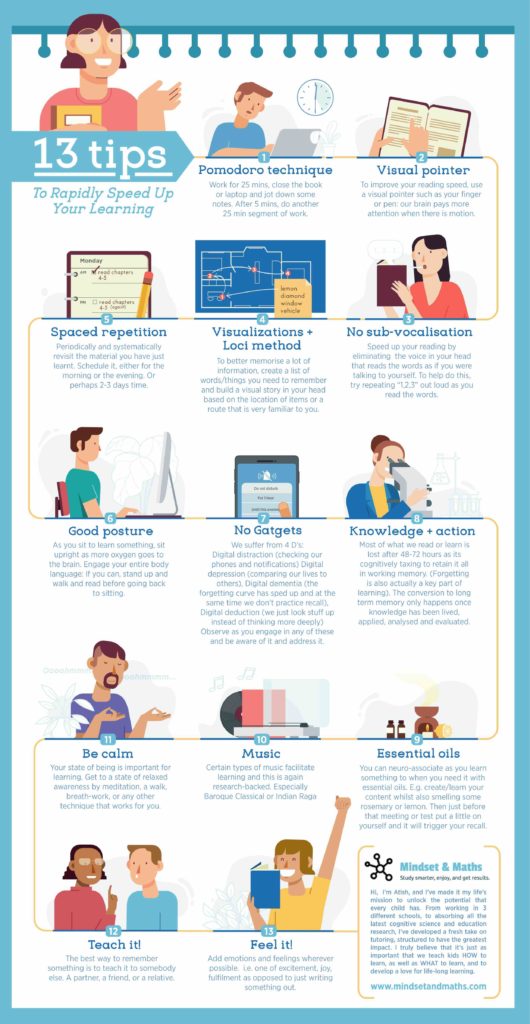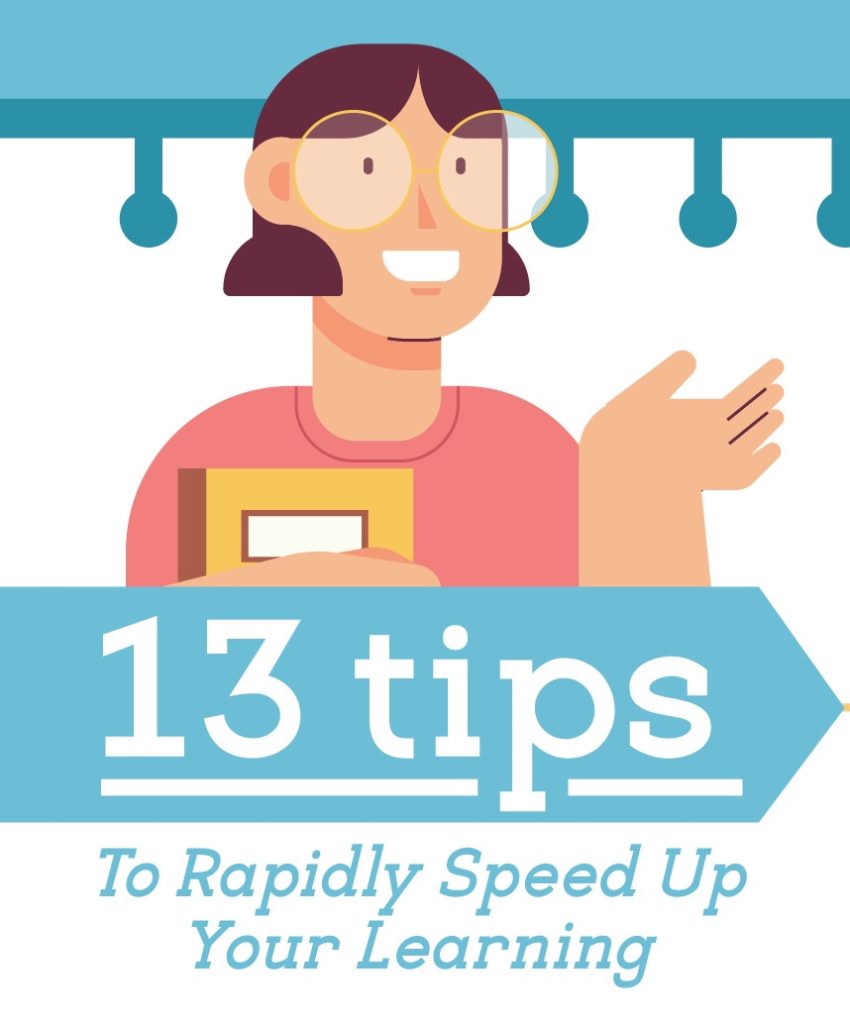
1. Pomodoro technique. Work for 25 mins, close the book or laptop and jot down some notes. In your notes write – why is this useful? how can I apply this? and when will I use this?. After 5 mins, do another 25 min segment of work. Reading and learning should be an active process, not a passive one (unless it’s fiction and for fun of course).
2. To improve your reading speed, use a visual pointer such as your finger or pen. Whilst this may seem child-like, it’s important as our brain pays more attention when there is motion, and the sensation of touch is another part of the brain that you can recruit to stay focused and immersed.
3. Speed up your reading by eliminating sub-vocalisation. This means the voice in your head that reads the words as if you were talking to yourself. To help do this, try repeating “1,2,3” out loud as you read the words. This removes the limitation of reading at the same speed as we talk. Your mind has the ability to absorb the words faster than we realise. This has really been working for me and I’ve gone from around 350 words per min to 500+ (with better comprehension & absorption). Reading becomes more like watching a movie.
4. To memorise a long list of items, bullet points, or anything else, use the power of your visual mind together with the Loci method. This has been around for 1000s of years. Essentially, create a list of words/things you need to remember and associate them with something you see or do every day. For example to remember the following list: tree, balloon, lemon, diamond, elephant, bus, broccoli, tennis ball, potato you would build a visual story in your head based on the location of items or a route that is very familiar to you. E.g. you wake up and look at your alarm clock and it is a tree (picture it vividly, with colour, branches etc), then you brush your teeth and instead of a toothbrush you are holding a balloon.. etc. Have fun with it. Then repeat the story in reverse. Close your eyes. Now put the list away and you should be able to easily recite those 9 items by visually going over your story. Memory experts use this to remember hundreds of thousands of items at any time. For me, I used it to remember 8 bullet points for a presentation I’m working on. The first point in that presentation is about wasted talent, for which I picture somebody slouching on the sofa. As I continue my journey around the house from the living room to garden each piece of furniture is associated with another point I’m trying to remember.
5. Spaced repetition. Periodically and systematically revisit the material you have just learnt. Schedule it, either for the morning or the evening. Or perhaps 2-3 days time. I’ve been doing this for two YouTube videos where there is rich content that I’d like to absorb and embed into my knowledge. I watch the same video when I wake and sleep at night and can largely recall at least 50% of it at any given time.
6. Posture is super important. As you sit to learn something, sit upright as more oxygen goes to the brain. If you can, stand up and walk and read before going back to sitting. Engage your entire body language as if you were about to learn the most interesting ever or as if you were meeting your idol and they were imparting some wisdom.
7. We suffer from 4 D’s . Digital distraction (checking our phones and notifications). Digital depression (comparing our lives to others). Digital dementia (the forgetting curve (which is key to learning has sped up and at the same time we don’t practice recall). Digital deduction – we just look stuff up instead of thinking more deeply. Observe as you engage in any of these and be aware of it and address it. I now keep my phone on airplane mode or in another room. I also actively try not to “google it” if I can stretch my brain for 60 seconds longer. Our brain works much like our body is a muscle, and we can train it.
8. Knowledge is not Power. Knowledge combined with action is power. Most of what we read or learn is lost after 48-72 hours as its cognitively taxing to retain it all in working memory. (Forgetting is also actually a key part of learning). The conversion to long term memory only happens once knowledge has been lived, applied, analysed and evaluated. Better to read one chapter and spend the rest of the week applying that principle or knowledge than reading several books and forgetting everything but one or two bullet points.
9. Essential oils help with recall. You can neuro-associate as you learn something to when you need it. E.g. create/learn your content whilst also smelling some rosemary or lemon. Then just before that meeting or test put a little on yourself and it will trigger your recall as these sensory glands are also triggered in active recall.
10. Certain types of music facilitate learning and this is again research-backed. Especially Baroque Classical or Indian Raga.
11. Your state of being is important for learning. Try to calm your central nervous system by meditation, a walk, breathwork, or any other technique that works for you. The key is to get to a state of relaxed awareness.
12. Teach it. The best way to remember something is to teach it to somebody else. A partner, a friend, or a relative. Failing that there is power in teaching it to yourself. Part of the Feynman technique involves simplifying what you have learnt, creating an analogy, and using your own words to describe what you’ve learnt. For me, I’ve found myself saying things like “and then my guy goes over here, and says let’s team-up with this guy” when I was revisiting some A-level Maths equation.
13. Add emotions and feelings wherever possible. Again it’s about recruiting every aspect of our biochemistry. If I’m learning a simple math theorem, I try to get myself into the state the person who found it must have felt when they proved it i.e. one of excitement, joy, fulfilment as opposed to just writing something out.

